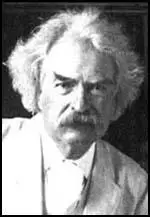Mark Twain

Samuel Langhorne Clemens, the son of a lawyer, was born in Florida, Missouri on 30th November, 1835. His father died when Samuel was 12 and soon after found work as an apprentice compositor. In 1853 he moved to St. Louis and over the next few years worked in the printing trade in Chicago, New York City and Philadelphia.
When he was 22 he became a steamboat river pilot and during the American Civil War, a soldier in the Confederate Army. After prospecting for silver in Nevada he became a journalist in Virginia City. He now adopted the pen name Mark Twain and moved to San Francisco where he came under the influence of Bret Harte, the editor of the Overland Monthly. Twain later claimed that Harte "trimmed and trained and schooled me from an awkward utterer of coarse grotesqueness to a writer of paragraphs and chapters." His first story that brought him national fame was The Celebrated Jumping Frog of Calaveras County (1865).
In 1867 Twain travelled to Europe and this resulted in the book The Innocents Abroad (1869). He returned to the United States and married Olivia Langdon. After a period as the editor of the Buffalo Express, he moved to Hartford, Connecticut, where he lived for the next twenty years. A humorous account of his travels to Nevada, Roughing It, appeared in 1872.
Twain's boyhood memories of life beside the Mississippi, The Adventures of Tom Sawyer, was published in 1876. This was followed by The Prince and The Pauper (1882). Twain's account of his steamboat experiences appeared in the Atlantic Monthly and these were expanded into the book Life on the Mississippi (1883).
Twain was now one of America's favourite writers and he had a series of best-sellers including A Connecticut Yankee in King Arthur's Court (1889), The Adventures of Huckleberry Finn (1885), Tom Sawyer Abroad (1894) and Tom Sawyer, Detective (1896).
After Twain's publishing company went bankrupt and the death of one daughter, and the incurable illness of another, Twain's writing became increasingly pessimistic and this began to alienate him from his readers. The Man that Corrupted Hadleyburg (1900), King Leopold's Soliloquy (1905), What is a Man? (1906) and Eve's Diary (1906), written after the death of his wife, sold poorly compared to his earlier books.
Mark Twain died on 21st April, 1910.
Primary Sources
(1) Mark Twain quotations (1860-1910)
I have never let my schooling interfere with my education.
When I was fourteen, my father was so ignorant I could hardly stand to have him around. When I got to be twenty-one, I was astonished at how much he had learned in seven years.
Travel is fatal to prejudice, bigotry, and narrow-mindedness, and many of our people need it sorely on these accounts. Broad, wholesome, charitable views of men and things cannot be acquired by vegetating in one little corner of the earth all one's lifetime."
There's always something about your success that displeases even your best friends.
Love seems the swiftest, but it is the slowest of all growths. No man or woman really knows what perfect love is until they have been married a quarter of a century.
Always respect your superiors; if you have any.
There is no sadder thing than a young pessimist, except an old optimist.
Twenty years from now you will be more disappointed by the things you didn't do than by the ones you did do. So, throw off the bowlines. Sail away from the safe harbor. Catch the trade winds in your sails. Explore. Dream. Discover."
The secret of getting ahead is getting started.
With courage you will dare to take risks, have the strength to be compassionate, and the wisdom to be humble. Courage is the foundation of integrity.
Courage is resistance to fear, mastery of fear, not absence of fear.
The two most important days in your life are the day you are born and the day you find out why.
Kindness is the language which the deaf can hear and the blind can see.
If you tell the truth, you don't have to remember anything.
The fear of death follows from the fear of life. A man who lives fully is prepared to die at any time.
A lie can travel half-way around the world while the truth is putting on its shoes.
Always do what is right. It will gratify half of mankind and astound the other.
Don't go around saying the world owes you a living. The world owes you nothing. It was here first.
It is noble to teach oneself, but still nobler to teach others - and less trouble.

